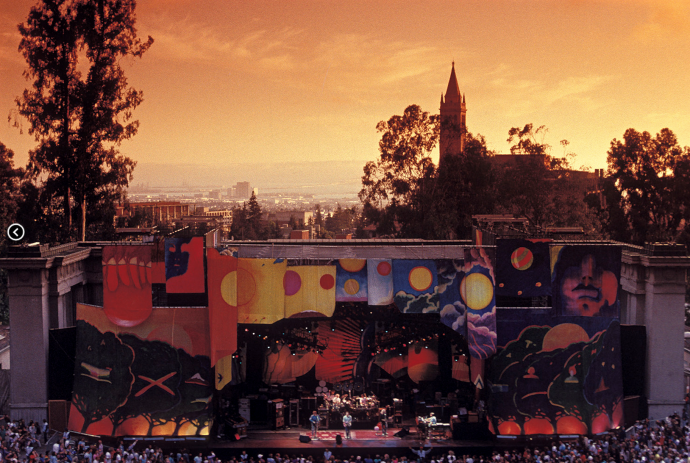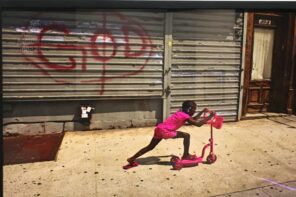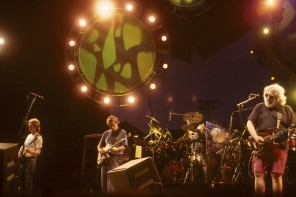she’s got everything I need,
A breeze in the pines and the sun and bright moonlight,
lazing in the sunshine yes indeed.
~ “Sugar Magnolia”
My childhood home was equidistant between two of the Grateful Dead’s regular Bay Area venues: Berkeley’s Greek Theater and Oakland’s Kaiser Convention Center. When the Deadheads came to Berkeley, they camped in the parking lot behind my high school, and when they came to Oakland, they camped behind my mother’s office in the Oakland Public Schools building.
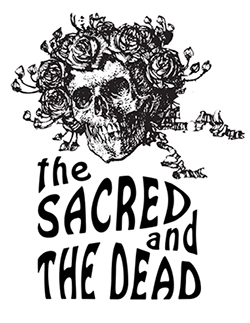
A special series on religion and culture produced in collaboration with the Office of Religious Life at the University of Southern California
Like a lot of Bay Area Gen X kids, many of my friends’ parents were of the original generation Deadheads, with deep ties to the band and its mobile subculture, including a girl from my high school whose mother supplied enough acid to Dead parking lots to pay her kids’ private school tuition. In other words, being a Dead fan, for someone like me, would have been the easiest thing in the world.
There was just one problem: I hated the Dead.
I hated their noodly, shuffling music; hated, in my nascent angry young feminist way, the glazed-eyed girls who swayed through those parking lots asking for change, and the “mamas” and “old ladies” minding the camp stove while 60-something-year-old Deadhead guys hit on my teenage friends by offering them tickets to shows.
Deadheads were anathema to my chosen subculture of socially conscious punks. East Bay punks were aggro and in your face about social justice, feminism, human rights; Deadheads, in our eyes, were too stoned and obsessed with their god Jerry to care.
Sometimes, I’d be out in Berkeley at night, coming out of a punk show in some basement or garage, and I’d hear the tail end of a Dead set drifting down from the Greek, always, always, always with the same finale: “Sugar Magnolia.” My friends and I would start roaring with laughter at that “doo doo-doo” chorus, occasionally passing a pedestrian in tie dye or flowy skirts who couldn’t get a ticket, and we’d keep laughing as that person started his or her ridiculous spinning dance in middle of the street.
That was their ritual, these Deadheads. Play “Sugar Magnolia” and they’d all start spinning. And we’d look at them and laugh.
It goes without saying that teenage girls lack maturity. There is plenty of evidence that they also are cruel. The things I hated as a teenager—Catholicism, camping, sports, and the Grateful Dead—also were things that were important to the people who cared about me, including my parents, friends’ parents, and teachers. Rebellion is fun when you’re 15, but by the time you hit your thirties, rebellion in the form of mindlessly jeering at what other people love gets a bit tedious.
You begin to reach for deeper things, to consider changing the world in ways other than mocking it. For me, that meant re-examining and eventually returning to Catholicism. It also meant giving the Grateful Dead another chance.
When I began teaching at University of California at Berkeley, getting to know my mostly older colleagues was sometimes a challenge. In my late 20s, I was lost in the sea of 40,000 students from all over the world. One afternoon, desperate for advice, I went to the office of my colleague Steve Tollefson, and we had one of those long, rambling conversations about teaching that inevitably forks into other topics.
Steve was in his 50s, but he could talk to anyone, from 18-year-old freshmen to emeriti faculty in their 70s and 80s. And somehow we got on the topic of the Grateful Dead.
“Oh oh oh oh!” Steve said, in the way he always did, “don’t you love the song ‘Ripple?'”
Maybe I cringed, but he insisted we listen to it right then, so we did. Eventually, through years of conversations, we made it, song by song, through the entire American Beauty album. Steve passed away in June of this year. That was 15 years after our “Ripple” conversation, and today, there are hundreds of Dead songs on my phone and dozens of live recordings in playlists, even a nod when I see a Deadhead sticker on a car.
I am a relapsed Catholic, and thanks to my friend, I am also a repentant Deadhead. Dear Jesus, let me confess: I even wear Birkenstocks.
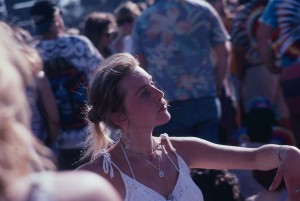
Shannon. Deadshow, Deadhead. Dominquez Hills, 1990. Photo by ChasM3/https://www.flickr.com/photos/chasm3/
“Sugar Magnolia,” however, still presents a challenge. Written by Robert Hunter and the band’s rhythm guitarist Bob Weir, its lyrics would raise the hackles of even the mildest of feminists.
The subject of the song not only takes the wheel for a stoned driver but “pays my ticket when I speed.”
“She don’t come and I won’t follow,” even while she “waits backstage while I sing to you.”
Having grown up around those parking lots full of Mamas and Old Ladies and glazed young girls, there’s something creepy in those lines. The hippie subculture was deeply misogynistic in many ways, and by the time the ’60s washed out and the ’70s rolled around, the Dead’s home base of San Francisco was awash in young women with venereal disease, heroin addiction, and mental health issues. The children who came out of these times know the dark side of hippie sexism better than anyone else.
I don’t doubt that some of the Dead’s kids and various ex-wives have stories to tell. Plenty of my friends who grew up in Deadhead families do.
But the Sugar Magnolia of this song is a fantasy, even if she’s loosely based on Bob Weir’s go-go dancer girlfriend of the time. The woman this song pays tribute to had “got everything delightful” because she isn’t real. She’s a projection of the imagination of her time—an earth mother moving through an idealized natural world.
In another era, this might be a poem by Shelly or Keats. And that’s where the layers of criticism come up against the thing about the Dead that makes picking them apart often a losing challenge.
The Dead were a fantasy. They were an escape from the harsher realities of their time.
They kept playing through the ugly parts of the ’70s and the ugly parts of the ’80s, and it took the death of Jerry Garcia in 1995 to get them to finally stop. Which, as their upcoming “final” final shows in Chicago this weekend demonstrate, they really never did.
What my friend Steve revealed for me that afternoon as we listened to “Ripple” in his office, was that you don’t have to pack up your life and go on the road to understand what the Dead might still be able to offer us, which is escape through pleasure.
“Sugar Magnolia” might be a song about groupies, or taking acid in nature, or driving a truck. But when it plays, and when you can manage to escape into it enough to imagine yourself getting up and spinning around like a Sufi, you don’t see what’s around you at the moment. The contextual misogyny endemic to almost any music of the ’60s drops away.
You don’t see tie dye, or skulls, or swirling skirts. You see a vision of something else.
Sufi Dervishes spin to “testify to God’s existence, unity, majesty and power.”
Deadheads spin to see what they can of Utopia, Heaven, Paradise.
Punks don’t spin, they mosh, but Greg Ginn from the seminal punk band Black Flag admits that the Dead are his favorite band, and mosh pits, after all, move in a circle.
So does time, on occasion.


